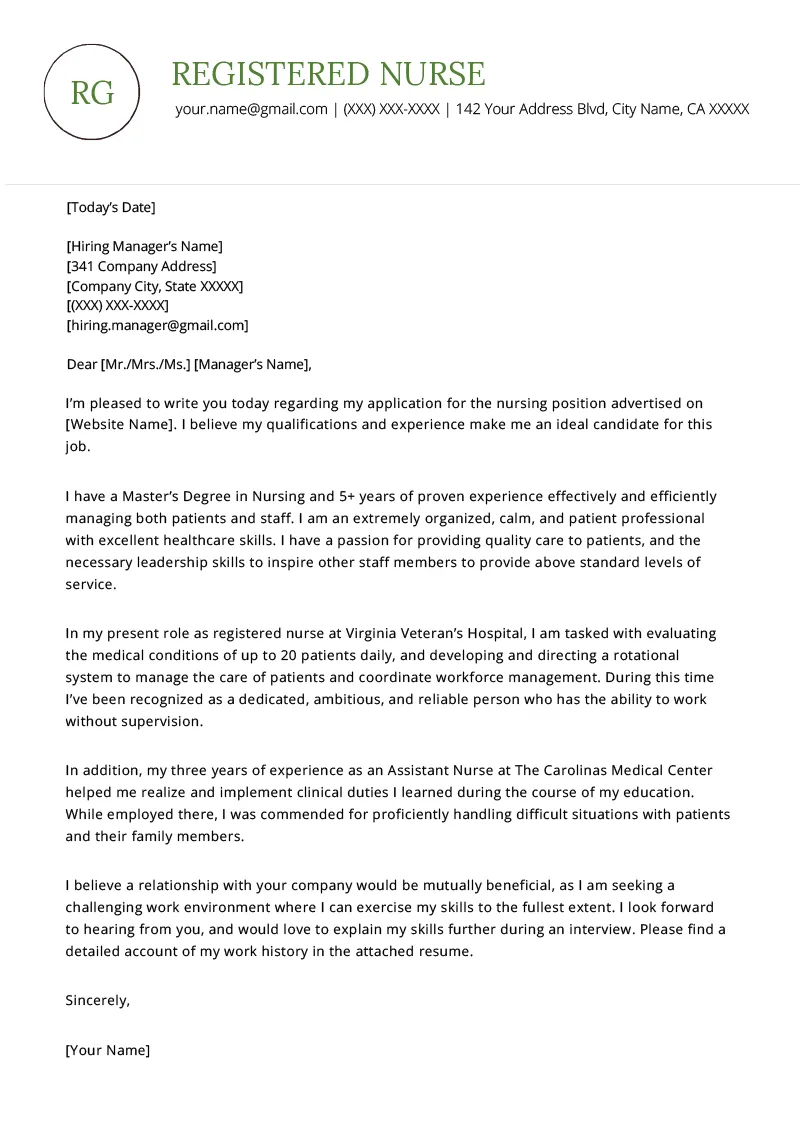Crafting a compelling nursing cover letter is a crucial step in securing your dream job. It serves as your first introduction to a potential employer, offering an opportunity to showcase your skills, experience, and passion for nursing. This guide provides you with the essential elements and strategies to create a powerful nursing cover letter that grabs attention and increases your chances of getting hired. A well-written cover letter can significantly differentiate you from other applicants and highlight your unique qualifications and experience. It’s not just a formality; it’s a vital tool in your job search arsenal.
Understanding the Importance of a Nursing Cover Letter
A nursing cover letter is more than just a formality; it’s your opportunity to make a strong first impression and demonstrate your enthusiasm for a particular role. It allows you to elaborate on the experiences and skills listed in your resume, providing context and depth that a resume alone cannot convey. It also gives you the chance to highlight your specific accomplishments and show how your qualifications align with the needs of the healthcare facility. Using a tailored cover letter shows your genuine interest in the position and the organization, setting you apart from candidates who submit generic applications. This personalized approach can significantly increase your chances of being selected for an interview, making it an invaluable tool in your job search.
Why a Cover Letter Matters for Nurses
In the competitive field of nursing, a cover letter provides a critical opportunity to showcase your personality and explain why you’re the perfect fit for the role. Nursing is a profession that requires empathy, critical thinking, and excellent communication skills, all of which you can demonstrate in your cover letter. It gives you a chance to highlight specific experiences that align with the job requirements and to explain any gaps in your employment history. Your cover letter allows you to showcase your understanding of the role and facility, demonstrating that you have researched the organization and understand its mission and values. This attention to detail and genuine interest can make a significant impact on the hiring manager, increasing your likelihood of moving forward in the hiring process.
What to Include in Your Nursing Cover Letter
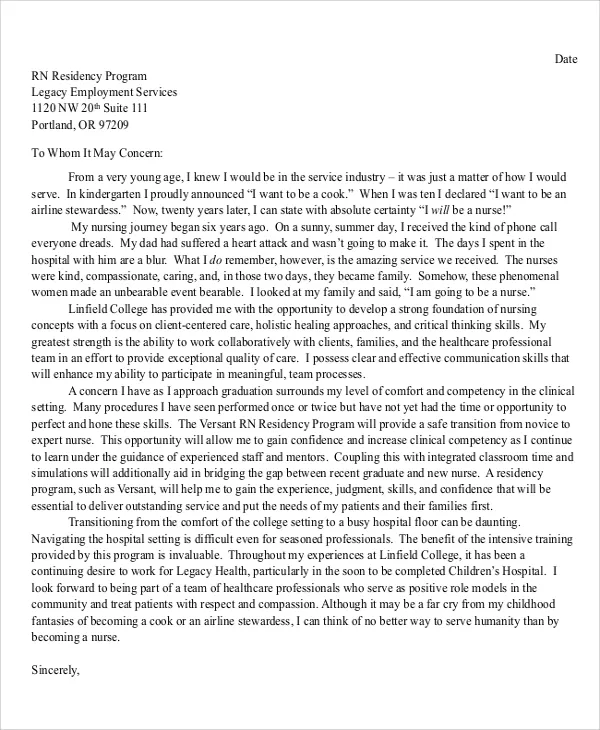
A well-structured nursing cover letter includes several key components that demonstrate your qualifications and suitability for the role. It should be concise, well-organized, and tailored to each position you apply for. Remember to always tailor your letter to the specific job description, emphasizing the skills and experiences that are most relevant to the position. Start with a professional salutation and clearly state the position you are applying for. The body of your letter should highlight your key skills, experiences, and accomplishments, with a focus on how you can contribute to the healthcare facility. Conclude with a strong call to action, expressing your enthusiasm for the opportunity and your availability for an interview.
Contact Information & Salutation
Your cover letter should begin with your contact information, including your name, address, phone number, and email address. Ensure this information is accurate and up-to-date. Following this, include the date and the hiring manager’s name and title, if known. If you are unsure of the hiring manager’s name, you can use a general salutation such as “Dear Hiring Manager.” Using the correct salutation demonstrates professionalism and attention to detail. When possible, addressing the letter to a specific person can create a more personal connection and show you’ve taken the time to research the organization.
Highlighting Your Skills & Experience
In the body of your letter, highlight your skills and experience in relation to the specific requirements of the nursing role. Focus on the skills and experiences that are most relevant to the job description. For example, if the job requires experience with electronic medical records, ensure that you mention your proficiency in this area. Use strong action verbs to describe your accomplishments and responsibilities. Mention specific patient care experiences, such as managing complex cases, administering medications, or providing patient education. This demonstrates your ability to perform the duties of the role effectively.
Quantifiable Achievements
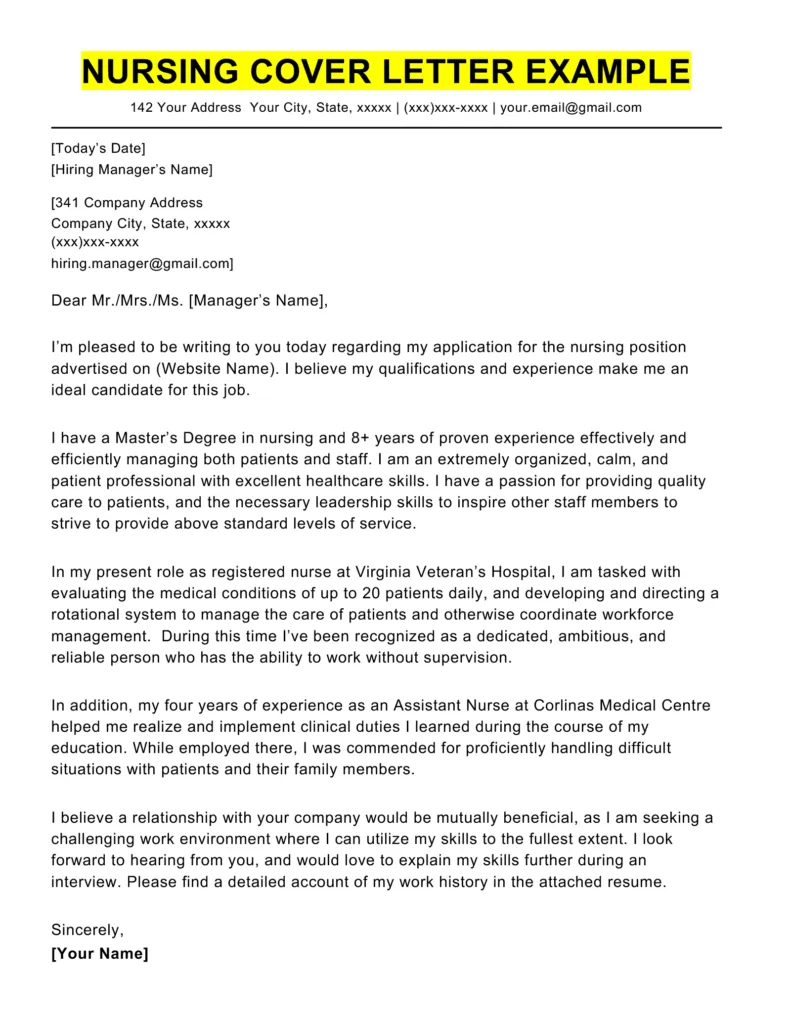
Whenever possible, quantify your achievements to provide concrete examples of your impact. For example, instead of saying “improved patient outcomes,” state “reduced patient readmission rates by 15%.” Provide specific data and statistics to support your claims. This demonstrates your ability to achieve results and adds credibility to your application. Use numbers to highlight your efficiency, such as the number of patients you have cared for or the specific processes you have improved. Quantifiable achievements are powerful because they provide tangible evidence of your value to the employer. Providing a real world examples and facts is far more effective than general statements.
Demonstrating Your Passion for Nursing
Showcase your passion for nursing by expressing your enthusiasm for patient care and your commitment to the profession. Explain why you are drawn to nursing and what motivates you. Share any personal experiences that have inspired you to pursue a career in nursing. Emphasize your commitment to providing compassionate and high-quality care. Mention any professional development activities, certifications, or specialized training you have completed, demonstrating your commitment to staying current with the latest advancements in nursing. This will show your dedication to the role and your interest in making a positive impact on patients’ lives.
Tailoring Your Cover Letter
Tailoring your cover letter to each specific job application is essential for making a strong impression. Generic cover letters are easily recognized and often discarded, while customized letters demonstrate that you have taken the time to understand the requirements of the role and the needs of the healthcare facility. This is the best way to demonstrate to the hiring manager you took the time to go above and beyond the minimum requirements. Take the time to personalize each letter.
Researching the Facility
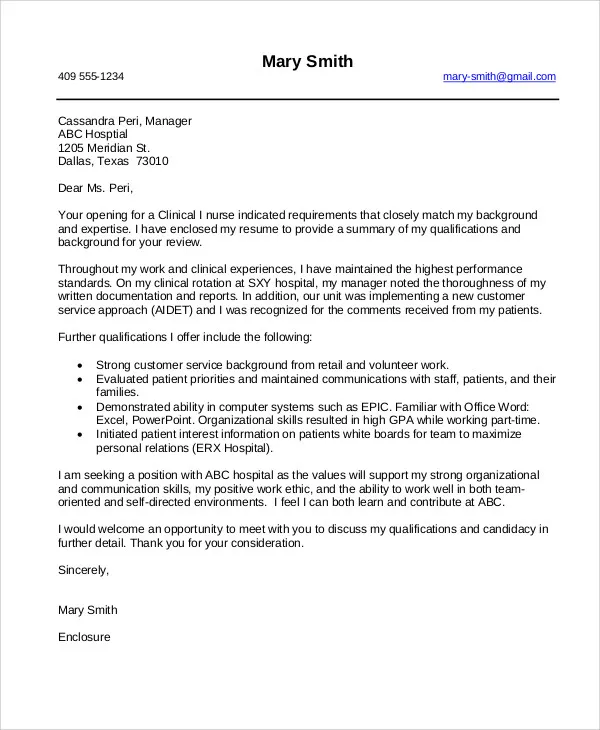
Before writing your cover letter, research the healthcare facility where you are applying. Learn about its mission, values, and recent accomplishments. This knowledge will help you tailor your letter to align with the organization’s goals and demonstrate your genuine interest in working there. Visit the facility’s website, read any available reviews, and review their social media accounts. This will give you a better understanding of the organization’s culture, the services they provide, and the types of patients they serve. This will help you tailor your letter to better highlight what they are looking for.
Matching Skills to Job Requirements
Carefully review the job description and identify the key skills and qualifications the employer is seeking. In your cover letter, specifically address these requirements by highlighting your relevant experience and skills. Provide examples of how you have successfully demonstrated these skills in previous roles. Use keywords from the job description to show that you understand the requirements of the position. This direct alignment with the job description will make it easy for the hiring manager to see how you are a good fit for the role. By using similar wording you can demonstrate that you’ve taken the time to understand the job.
Formatting Your Nursing Cover Letter
The format of your cover letter is just as important as its content. A well-formatted letter is easy to read and reflects your professionalism. Proper formatting shows you take the time to pay attention to detail and that you’re taking the application process seriously. Use a professional font, maintain consistent spacing, and choose a clean layout. These design choices will help the recruiter more easily digest your letter and appreciate the content.
Professional Font & Layout
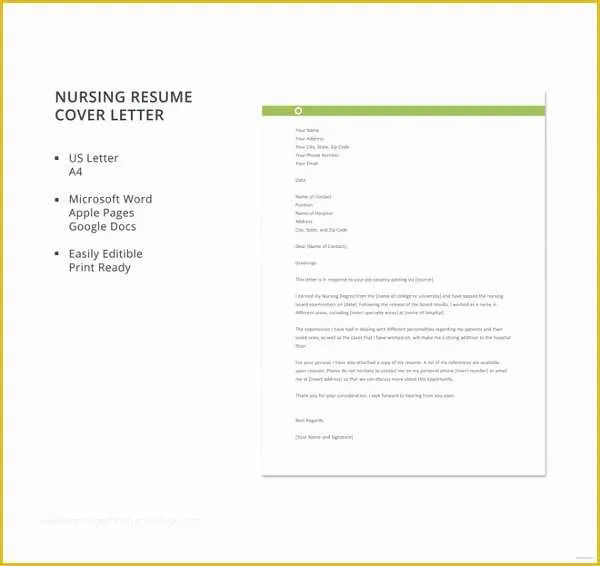
Choose a professional font, such as Times New Roman, Arial, or Calibri, in a size between 11 and 12 points. Use single-spaced lines with a space between each paragraph. Align your text to the left and avoid full justification. Ensure that your cover letter is concise and easy to read. Aim for a one-page length, unless the job description specifically requests more information. Use a clean and organized layout with clear headings and subheadings to make the letter easy to scan.
Proofreading & Editing
Proofread your cover letter carefully for any grammatical errors, typos, or spelling mistakes. Ask a friend, colleague, or career advisor to review your letter for accuracy and clarity. Errors can detract from your professionalism and negatively impact your chances of getting an interview. Make sure that your writing is clear, concise, and easy to understand. Ensure that your sentences flow well and that your ideas are presented in a logical order. This will help ensure that your message is conveyed clearly and effectively. Make sure your document is also formatted correctly for different devices and that the layout is not disrupted by the platform it is opened with.
Nursing Cover Letter Examples & Templates
Reviewing nursing cover letter examples can provide valuable insights into how to structure and write your own. By studying different examples, you can gain inspiration and learn how to effectively showcase your skills and experiences. You can also use templates as a starting point, tailoring them to your specific qualifications and the requirements of the job. Examples will show you how to frame your experience, showcase your skills, and present your information in a compelling and engaging manner.
Example 1 Entry Level Nurse
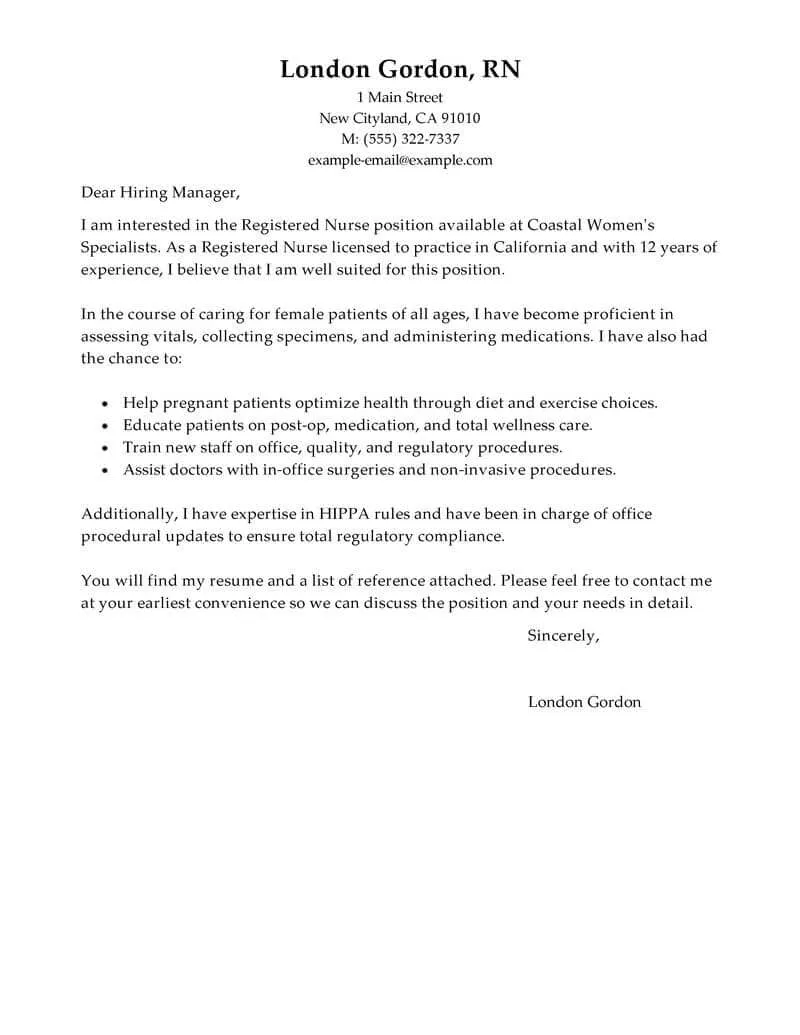
For entry-level nurses, a cover letter should focus on highlighting educational background, clinical experiences, and any relevant volunteer work. This is your time to shine and show your passion for nursing. Emphasize any clinical rotations or internships, and highlight any skills or experiences gained during these opportunities. Showcase any relevant coursework or academic achievements and explain your interest in nursing and patient care. It’s also appropriate to express your desire to learn and grow in the profession. Use a tone that is enthusiastic and demonstrates your eagerness to begin your career. (Example content here)
Example 2 Experienced Nurse
Experienced nurses should leverage their cover letters to showcase their specialized skills, achievements, and leadership abilities. Provide specific examples of how you have successfully managed patient care, implemented new protocols, or mentored junior nurses. Highlight your experience in particular medical specialties or patient populations. Quantify your achievements whenever possible, using data to demonstrate your impact on patient outcomes or organizational efficiency. This shows you’ve contributed positively to the facility you worked for and highlights your experience level. (Example content here)
Example 3 Nurse Manager
Nurse managers should use their cover letters to emphasize their leadership skills, management experience, and strategic abilities. Showcase your experience in leading and motivating teams, managing budgets, and improving healthcare operations. Highlight any successful initiatives you have implemented, such as quality improvement projects or staff development programs. Include any certifications and demonstrate your commitment to leadership. Include examples of how you successfully managed staff, developed team programs, or improved the quality of care in a previous role. (Example content here)
Finalizing Your Nursing Cover Letter
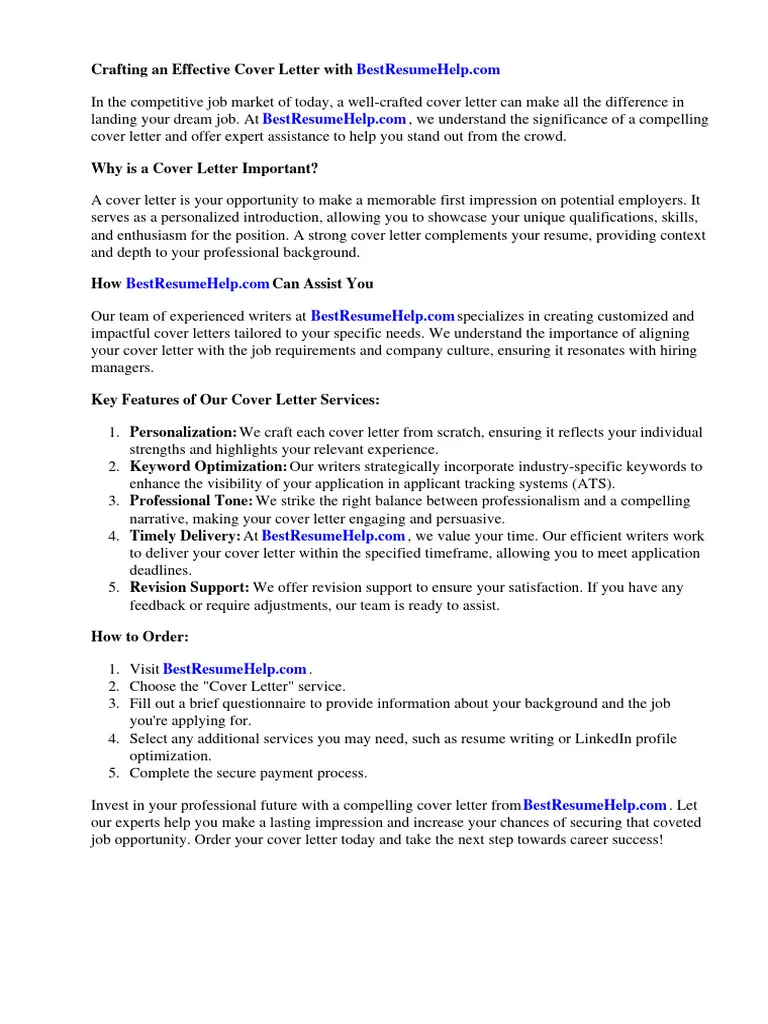
Before submitting your nursing cover letter, ensure that it is polished, well-written, and tailored to the specific job. Review your cover letter for any errors in grammar, spelling, or punctuation. Double-check all of your information and be sure to proofread to make certain that your information is correct. Tailor your cover letter to each specific role you are applying for, highlighting the most relevant skills and experiences. By following these steps, you can create a cover letter that effectively showcases your qualifications and increases your chances of landing an interview.
Call to Action & Closing
Conclude your cover letter with a clear call to action, expressing your enthusiasm for the position and your interest in an interview. Thank the hiring manager for their time and consideration. Provide your contact information and express your availability for an interview at their earliest convenience. Ensure that you maintain a professional tone throughout your letter. Finish with a professional closing, such as “Sincerely” or “Respectfully,” followed by your name and signature.
Submitting Your Cover Letter
When submitting your nursing cover letter, follow the instructions provided in the job posting or application guidelines. If submitting electronically, ensure your cover letter is formatted as a PDF document to preserve its formatting. Double-check that you have included all necessary documents, such as your resume and any required certifications. Make sure the file name is clearly labeled with your name and the position you are applying for. Following these simple steps will help ensure that your application is received and considered properly by the hiring manager. By following all of these steps, you’ll increase your chances of landing the interview.
In conclusion, a well-crafted nursing cover letter is a powerful tool in your job search. By understanding its importance, incorporating key elements, tailoring it to each job, and following the tips outlined in this guide, you can create a cover letter that highlights your skills and increases your chances of landing your dream nursing job. Remember to always tailor your letter, showcase your passion, and proofread carefully. Good luck with your job search!
